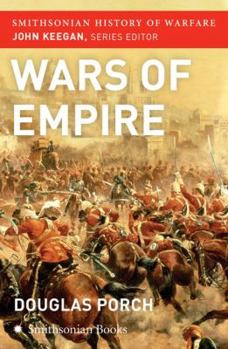The Wars of Empire (Smithsonian History of Warfare)
(Part of the Cassell History of Warfare Series)
Select Format
Select Condition 
Book Overview
.""an exciting saga, written by a gifted writer with the capacity to explain military tactics and strategies in laypersons' terms.filled with a fascinating array of characters.lush illustrations... This description may be from another edition of this product.
Format:Paperback
Language:English
ISBN:0060851422
ISBN13:9780060851422
Release Date:January 2006
Publisher:Harper Perennial
Length:240 Pages
Weight:0.90 lbs.
Dimensions:0.5" x 5.1" x 7.8"
Customer Reviews
4 ratings
A challenging task handled with grace
Published by Thriftbooks.com User , 16 years ago
Porch is given a seemingly hopeless task: discuss a history that not only spans CENTURIES of warfare, but also an impossible variety of cultures and political contexts. Unlike other authors in this Smithsonian series, Porch approaches this seemingly impossible task with both energy and vision. Porch must have quickly recognized that a strictly chronological approach would not have been at all insightful. There were simply too many Western powers trying to colonize vastly unrelated parts of the globe at the same time... any chronological approach to this topic in such a small book was doomed to becoming a simple list of battles and dates with little comment. Instead, Porch chooses as his unifying structure the various strategies applied by Imperialists and their indigenous enemies. Porch identifies commonalities in both political and military strategies used in vastly different contexts, and organizes his discussion into these strategic lessons. The result is that battles in the 1700's may be mentioned in the same sentence as battles in the 21th century, provided that they present antagonists with comparable dilemmas. The advantage to this approach is that Porch is free to add profound insight without exploding the book to re-teach the lesson each time. The disadvantage, of course, is that all these tongue twisting names and dates seem to pop out of nowhere in the context of a lesson and can become hopelessly confusing for a first time reader. Obviously, this approach makes it difficult to assemble any chronological narrative after just one reading, but Porch assumes that you will be reading this MORE than once. Porch ensures that there is sufficient information to allow a careful reader to go back and reconstruct a Colonial narrative from any viewpoint they choose. The maps and indicies in this book are absolutely vital, as they provide a very important launching point for a reader to go back and adopt a particular perspective from which to re-experience this book with a continent, imperial power, or century in mind. Finally, the emphasis on "lessons learned" shows uncomfortable relevance to the American experience in Iraq. There is no direct mention of this occupation, so it is possible that the book was written before the invasion, but it is abundantly clear that the lessons learned painfully by imperial powers of centuries past were utterly disregarded by the Americans.
Excellent collection about military history
Published by Thriftbooks.com User , 17 years ago
This title is for lovers of good reading and for those who enjoy military hystory.
Excellent treatment of a timely subject
Published by Thriftbooks.com User , 17 years ago
Porch does an outstanding job explaining the reasons behind the initial successes of European colonial expansion, emphasizing the role played by civilian colonial administration in solidifying gains made by force of arms. A book that planners of the Iraq misadventure would have definitely benefitted from.
A tough task, but well done
Published by Thriftbooks.com User , 22 years ago
Wars of Empire by Douglas Porch is part of the Cassell History of Warfare series edited by John Keegan. The title actually is a bit of a misnomer. It refers to the usage prevalent in Eurpoe around 1700-1900. By Empire, it means an imperial colonial system, and so examines predominately the European experience, although the American experience in the Phillipines, and Japanese efforts are also discussed. The series has been notable in its flexible approach. Rather than restricting its authors to a specific struggle or time period, the series has allowed some topics to span larger ranges of time and space. (examples: Age of the Fighting Sail, War in the Air: 1914-1945) This method of looking at the common points along a continuum helps to formulate a better understanding of seemingly disparate topics. Major strengths: briefly summarizes the major imperial wars which created the vast colonial empires of the European powers between 1700-1900. It highlights their successes and failures. It traces the importance of technology (notably machine guns, naval power, telegraph) and how these actions were part of a greater political/economic plan. Of interest to current readers is the history of how areas were "pacified", and why empires have failed. The last chapter "Imperial Twilight?" examines why the great colonial empires fell apart after WWII. Major weaknesses: it requires the reader to have some notion of the political climate of the different eras, and be able to sense the vast scales involved.So, in conclusion, a well done effort on a complex topic. Not just a history of little known colonial actions.





